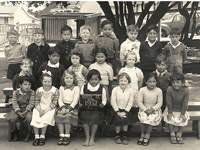
When Napier Street School opened in 1888, Freemans Bay was a very different place. Sandwiched between the central city and the far western suburb of Ponsonby (whose few residents at the time were, therefore, Auckland’s original Westies), Freemans Bay was already densely populated with Auckland’s working class.
Many of the school’s students came from the cheek-by-jowl cottages in the area bounded by Nelson St, Wellesley St, Union St and Wellington St. Most of those dwellings are long gone, demolished by the Auckland City Council’s “urban reclamation” programme in the 1950s and 60s, and the few that remained were removed for the motorway in the mid-1970s.
In the 125 years of the school’s existence its student population has reflected huge demographic change. In the late 1940s Maori all over the country began to move into the cities, and in Auckland many of them settled in Freemans Bay. In the late 1950s the migration of Pacific people into Auckland began, and increased significantly in the 1960s and 70s. Again, many settled in Freemans Bay and their children attended Napier St School, often arriving without a word of English.
In the 1970s the worldwide trend towards inner-city gentrification began, gathering pace in the 80s and 90s until these days Freemans Bay is one of the most expensive parts of Auckland – a fact which would have astonished parents at the school only a couple of generations ago.
Immigration rule changes in the 1990s have added another layer to the story, prompting people from countries the world over to move to New Zealand, most of them to Auckland, where many of them live – at least initially – in the new multi-storey apartment buildings in the CBD.
The result is that Freemans Bay School enjoys one of the most diverse student populations of any school in the country, which is celebrated as a real strength.
The much-delayed English draft curriculum is now out for consultation, generating discussion from teachers.
Research from AUT demonstrates arts, culture and recreation have positive impacts on all aspects of…
How effective has the school phone ban been in achieving its aims? Researchers from the…
School camps and excursions deliver hands on learning experiences, helping to consolidate classroom learning.
Innovations in AV technologies present new opportunities to engage with students. We look at how…
A new report from the University of Auckland’s Our Voices Project asks young people what…
This website uses cookies.